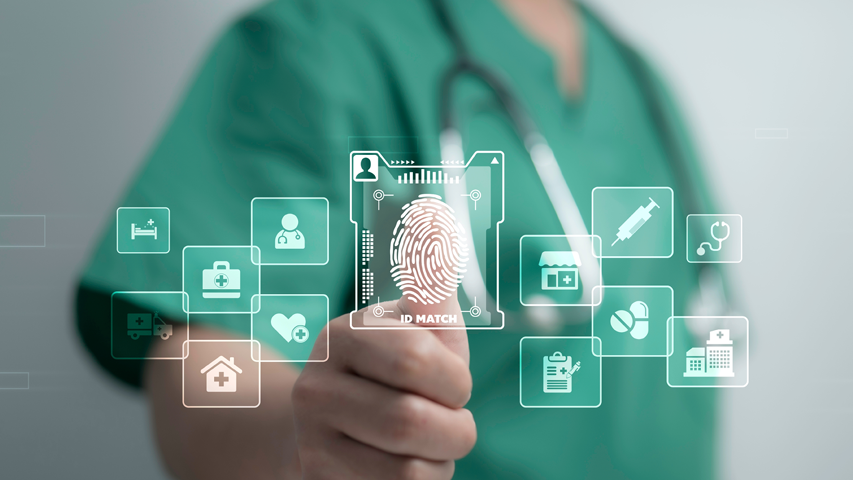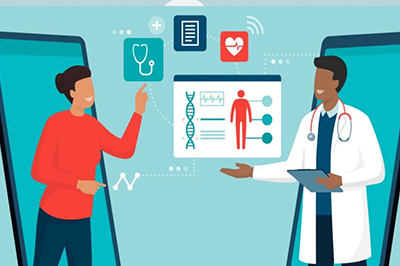How TSPs Can Transform Hospital Safety and Efficiency
Emerging identification technologies are shaping the future of hospital check-in. Here’s why technology solutions providers (TSPs) are key to...
BlueStar's diverse portfolio offers unparalleled access to premium products and services that drive business growth and success. From state-of-the-art hardware to advanced software solutions, our portfolio is designed to empower businesses with the tools they need to thrive in today's competitive landscape.
Our vertical-based content focuses on different industry technologies, solutions, and insights.
A true VAD offers top-notch pick, pack and ship services, and provides programs and services that add value to the distributed products that increase their value or worth.
The BlueStar Difference3 min read
BlueStar December 28, 2022 11:02:00 AM EST

Solution providers who can create total solutions are poised to take advantage of a great opportunity.
Mobile health, using mobile-connected devices and applications to support healthcare, is a growing trend. The global market, valued at USD 50.7 billion in 2021, is growing at an 11 percent CAGR through 2030, according to Grand View Research, driven partly by the increasing focus on personal health and fitness. However, beyond consumer devices and apps that focus on well-being, the market is also growing due to mobile health adoption by healthcare professionals. With increased smartphone and internet penetration, physicians can leverage this technology for remote patient monitoring and provide healthcare services to underserved areas.
What is Mobile Health?
Mobile health differs from telehealth, which enables remote patient visits and diagnoses. Mobile health encompasses using wearable devices for patient monitoring, sharing data with electronic medical records, and, in some cases, treatment or medication delivery. It also includes solutions for communicating with patients and other care team members.
The Outlook for Mobile Health’s Future
To make the best forecast of the future of mobile health, start by looking back. The global COVID-19 pandemic underscored the need for healthcare providers to address patient care in new ways. Mobile health offers more resilience when traditional care delivery isn’t feasible and unique ways to provide care effectively in the future, come what may.
Mobile health also has the potential to help manage chronic conditions. Mobile health solutions can include sensors that detect changes in patients’ conditions, such as a spike in blood pressure or blood glucose and provide alerts to remind them to change their behaviors or take action. This feedback may even help the patient adopt healthier lifestyles long term.
Additionally, this technology offers benefits to healthcare professionals beyond doctor-patient interactions. Mobile health can help researchers conduct clinical trials more effectively, collecting data remotely – and reducing the costs of the trials by 15-20 percent. Additionally, healthcare administrators and payers see mobile health as a cost-effective way to improve patient outcomes and reduce administrative time, giving physicians and nurses more time to focus on patients.
From a patient’s point of view, expectations are high. PwC research found that 48 percent of people believe mobile health will improve the quality of healthcare they receive. Additionally, 46 percent feel it will reduce healthcare costs, and 52 percent consider mobile health key to making healthcare more convenient.
Mobile Health Challenges for Solution Providers
A growing market represents opportunities for solution providers; however, your challenge is to ensure that the mobile health apps and devices you provide are effective, secure, and reliable.
Some considerations when implementing mobile health solutions include the following:
Regulations
The regulatory community has worked to keep up with advancements in mobile health. In 2007, the World Health Organization (WHO) passed a resolution to control the use of these technologies and provide best practices for evaluating them. The organization addressed technological advancements in the years following and, in 2019, created a Department of Digital Health.
In addition, the International Medical Device Regulators Forum (IMDRF) has enhanced the quality of international standards, the unique device identification (UDI) guide, and integrations with medical devices. The EU has also taken action to ensure that medical devices are safe with directives such as EU 2017/745, which regulates the sale of medical devices.
You must educate yourself on regulations and best practices to provide compliant systems to your clients that ensure patient safety and privacy.
Reliable Communications
Service levels must be as high as possible with mobile health. Disruptions in communications or lost data are unacceptable when patients’ well-being is at stake. Advances in 5G can provide the speed and support for higher numbers of devices in the “Internet of Medical Things” that can make mobile health a viable solution.
Integration with Healthcare Systems
Interoperability is a priority for medical devices and systems. However, your clients will need your expertise to ensure that the mobile health devices they choose for their patients accurately share data with their electronic medical records (EMR) and other systems in their complex IT environments. Testing is an essential step before implementing devices or applications at scale.
Cybersecurity
Unfortunately, mobile health devices connected to healthcare networks are targets for cyberattacks. When actors can control devices or use them as entry points to the network and hold data for ransom, they can disrupt patient care and create catastrophic outcomes. Therefore, all mobile health solutions – including devices, firmware, and applications – must be updated and protected with two-factor authentication, firewalls, monitoring, antivirus, and data encryption.
Meet the Challenge
With mobile health, healthcare providers aren’t looking for devices or apps. They’re seeking total solutions that quickly deploy and deliver value. PwC reports that the majority of doctors and payers they’ve surveyed see mobile health as offering exciting potential, but they find few proven solutions on the market.
Consider taking up the challenge to fill this need with compliant, interoperable solutions that keep patient data secure and accessible to healthcare practitioners and systems that can use it to enhance patient care.

Emerging identification technologies are shaping the future of hospital check-in. Here’s why technology solutions providers (TSPs) are key to...

Take the opportunity to provide solutions that give healthcare organizations access to information and allow them to save time and enhance the...

Healthcare mobile devices have proven their value during the pandemic and will continue to deliver long-term.